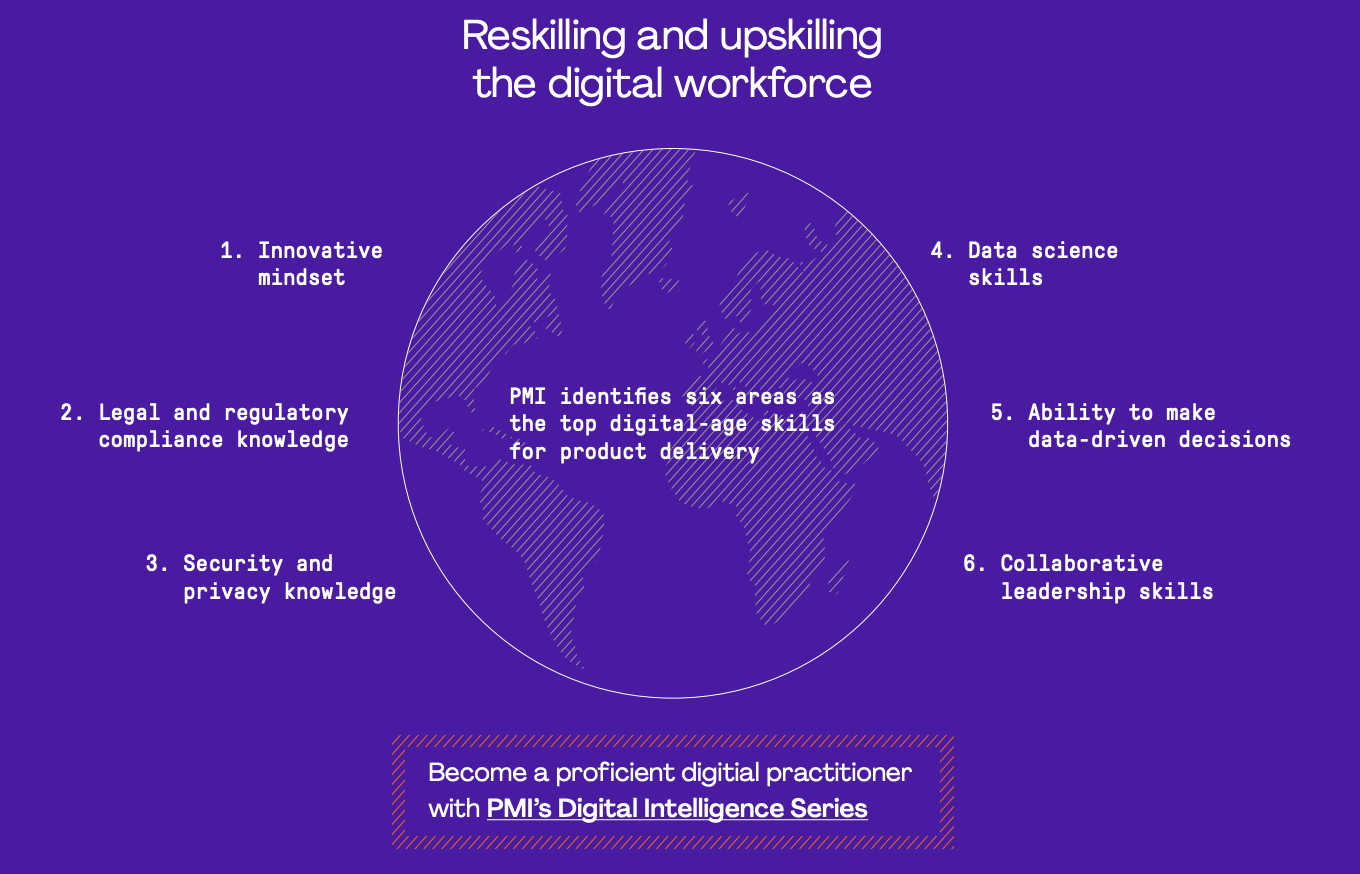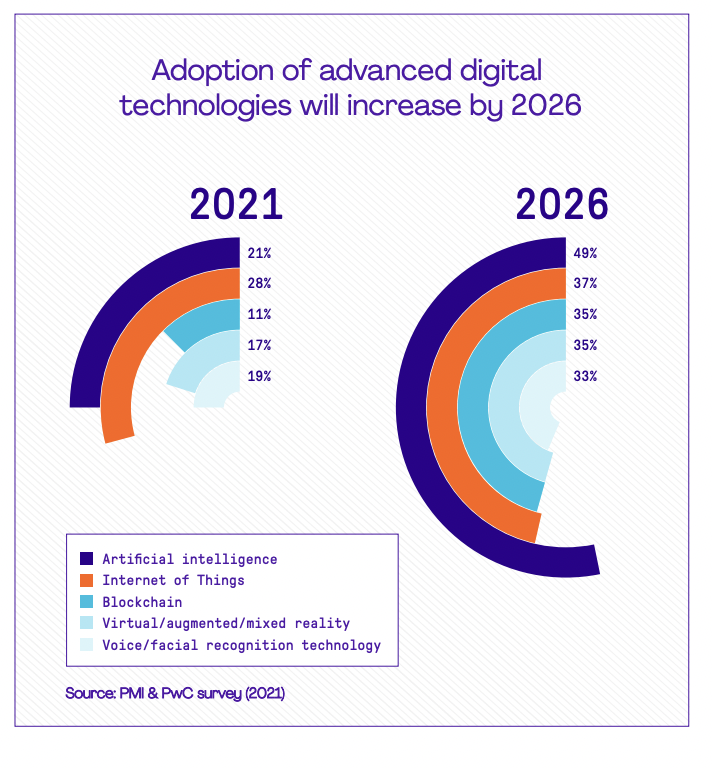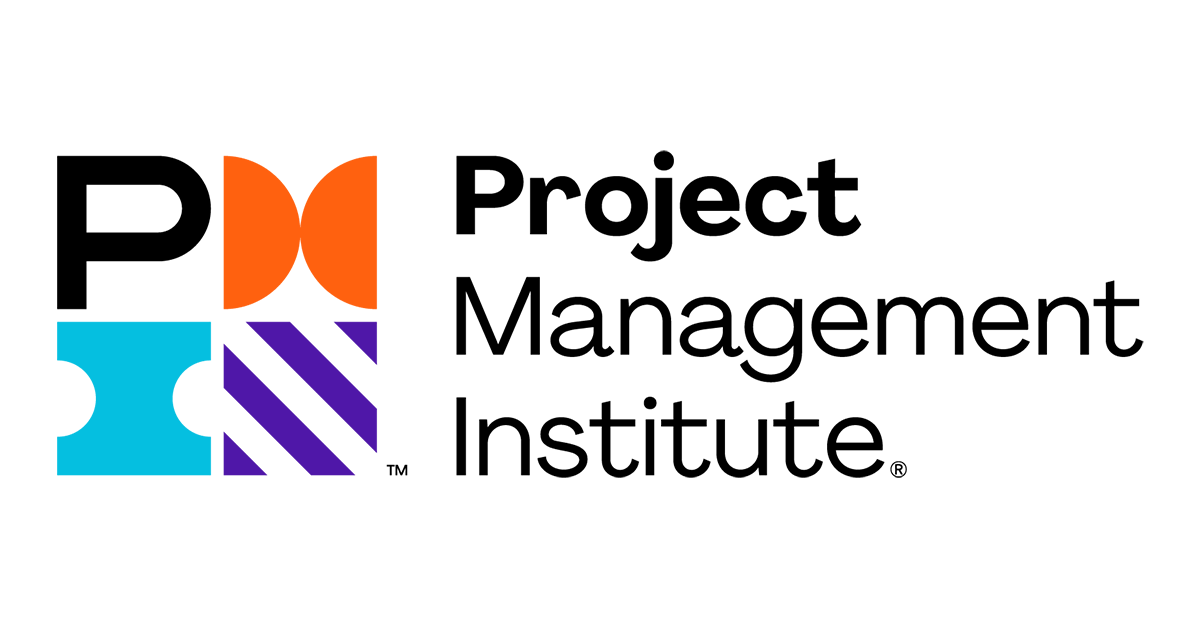There is almost no field of endeavor that is free from the constant drive of technological change. Even before we get used to the latest collaboration tool or smart home appliance, newer technology arrives with up-to-date features. While these solutions can save time, improve productivity and support innovation, they can also present risks, such as data breaches and loss of privacy.
Digital transformation was underway prior to the advent of the COVID-19 pandemic, with many organizations redefining their core business models to gain competitive advantage in an unceasingly changing marketplace of products and ideas. Technologies like cloud computing, the Internet of Things (IoT) and artificial intelligence (AI) were deployed to enhance the customer experience, boost employee efficiency and improve project outcomes.
It is no contradiction to say that transformation has now become business as usual. PMI’s Pulse of the Profession® in-depth report, Next Practices: Maximizing the Benefits of Disruptive Technologies on Projects, determined that a vast majority of innovators, which are defined as highperforming organizations that have a mature digital transformation strategy, indicate the adoption of disruptive technologies has supported significant improvement in meeting or exceeding business objectives.
The pandemic greatly accelerated an expansion of digital technologies, especially tools to enable online collaboration and remote work. The trend toward remote work had been gaining speed, facilitated by digitization and improved connectivity. But any barriers or hesitation about adopting a remote model were swept aside as the ability to work from home became necessary to carry on normal business. This shift looks likely to become entrenched in the foreseeable future.
 Companies also rushed to bring new digital offerings to market. According to McKinsey, the rate at which companies introduced products and services that are digital in nature advanced by six years in North America, seven years in Europe, 10+ years in AsiaPacific and seven years globally. Results vary across sectors, with the most significant increases occurring in healthcare and pharma, financial services and professional services.
Companies also rushed to bring new digital offerings to market. According to McKinsey, the rate at which companies introduced products and services that are digital in nature advanced by six years in North America, seven years in Europe, 10+ years in AsiaPacific and seven years globally. Results vary across sectors, with the most significant increases occurring in healthcare and pharma, financial services and professional services.
Organizations will continue to invest in AI to augment skills like decision-making, risk management, data analysis and knowledge management. But if and when AI proves capable of replacing human-like intelligence is a subject of much debate and speculation.
In November 2021, Eric Schmidt, former CEO of Google, joined by former U.S. Secretary of State Henry Kissinger and MIT computer scientist Daniel Huttenlocher, suggested that our future course should neither be to defer to AI nor resist it, urging us instead to focus on “shaping AI with human values, including the dignity and moral agency of humans.”
These concerns will require a sharper focus as we advance into the digital future. In order to support meaningful application of AI, organizations will need to invest in acquiring or training IT and data specialists, create a strategy for data governance and maintain transparency. Data collection is the raw material that fuels the expansion of disruptive technologies and continued digital transformation.
Protecting the confidentiality, integrity and availability of data must be an essential part of any response to these future-focused business initiatives. The topic of data ethics is further explored in this report, along with cybersecurity and its implications in the modern workplace. Both areas must be approached with heightened awareness and diligence if we are to transition into a reliable future built on digital progress.

Innovating for Disruption: Interview With Ade McCormack
Ade McCormack helps organizations around the world transform for the digital age. We spoke with Ade McCormack, disruption readiness advisor, about a range of digital issues. Here, he shares his views on the digital disruption landscape. “I think where we are going to see a big push in the next year is in augmented reality (AR) and virtual reality (VR),” says McCormack. Even traditional industries that are currently tied to a physical location, like plumbing, could be disrupted by AR.
“Now all of a sudden, the consumer can be looking underneath the sink with an AR map and instructions. There could be one megaplumbing company in, let’s say, Argentina that handles everyone’s plumbing needs. We get complete disruption of the need for physical plumbers.”
But technology isn’t enough if the business model is no longer fit for purpose. Leaders can’t expect to simply “sprinkle your old business model with the latest technologies.
That’s not going to cut it,” says McCormack. “We need to move beyond the industrialera, process-driven factory model to thrive in this increasingly disruptive age. If you enjoy dominance today, it is transient at best. You better be thinking about your next innovation.” Right now, McCormack feels like there isn’t enough focus on the future. “Employers are more focused on recreating 2019.
I think they’re going back to prepandemic ways of working as a kind of comfort blanket. They’re grabbing certainty where they can grab it. But that’s not going to work. Postpandemic disruption is only just beginning.”
A lot of the attention at the moment is around hybrid working and ensuring we have technologies in place to allow people to work from home securely, which in itself is not necessarily a technology innovation. ADE McCORMACK ” Disruption readiness advisor
Training people for new technologies is time-consuming, costly and uncertain. We need to implement a strategic process and make sure projects are aligned with the technologies that have the best chance of success. MARCOS LOPEZ REGO ” Ph.D., PMP



